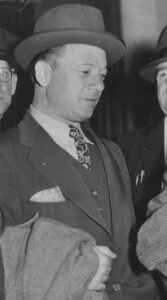Standing Up In the Electric Chair

For 18 months, Herman Petrillo tried by every means possible to get his death sentence commuted to life. He even appealed to President Franklin D. Roosevelt.
He did live three years longer than his victim Ferdinand Alfonsi, who succumbed to arsenic poisoning at the National Stomach Hospital in October 1938 after seven weeks of intense pain.
Petrillo spent about four hours of his last day on earth whispering through the bars with Willie Jones, a killer whose cell adjoined his.
He wrote letters to his wife and children and to Warden Stanley Ashe. He ate the regular prison fare sparingly. He spent some time in frenzied prayer. Witnesses said it sounded like he was talking gibberish. He died pleading for mercy.
When guards came for him, Jones started singing Negro spirituals: “Holy, Holy, Holy! Lord God Almighty! Early in the morning our song shall rise to Thee…”
Rev. F. P. McCreesh, the Catholic chaplain, recited prayers as he led the way to the death chamber. Guards had to hold Petrillo upright for the short walk.
With Jones’ soulful voice still audible in the background, Petrillo protested his innocence as he was strapped into the chair. He made several attempts to rise from it. As guards were adjusting the lethal contacts, Petrillo stretched out his arms, looked in the direction of the official witnesses and said in broken English, “You wouldn’t want to witness the death of an innocent man! Give me a chance to prove my innocence!”
The guards pushed him down, but he tried to rise up again.
He started to say, “I want to see the governor,” but, when the head contact and mask were slipped over his face, his words disintegrated into a scream. By then, Jones had segued to singing, “There’s No Rest for the Weary.”
Executioner James Lee Wilson pulled the switch at 12:30 a.m. Two thousand volts of electricity shot through Petrillo’s body. Three minutes later, Dr. J.G. Weixel and Dr. Otto Ranik declared him dead.
Jones kept singing in his cell.